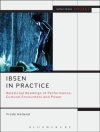Revitalizes Alexander Kluge’s classic 1979 film, showing it to be not just great storytelling but also an exploration of the poetic force of Frankfurt School Critical Theory.
Alexander Kluge achieved his breakthrough at the 1966 Venice Biennale with his first feature,
Yesterday Girl (
Abschied von gestern), but it is arguably his 1979 film
The Patriot (
Die Patriotin) that first embodied the great heights his storytelling could reach. Titled after its heroine, the history teacher Gabi Teichert,
The Patriot is, however, much more than just a curious story about a headstrong pedagogue intent on teaching kids a version of German history that does not end in war and death: it is one of the finest examples of Kluge’s exploration of the poetic force of Frankfurt School Critical Theory. This book pursues
The Patriot’s conception as a cinematic extension of the theoretical agenda that Kluge and social philosopher Oskar Negt began developing just as the Frankfurt School’s first generation was ending. It will guide twenty-first-century English-language readers past superficial interpretations of the film’s engagement with German history. By asking how and why
The Patriot brings the twin concepts of history and obstinacy – the human propensity to resist capitalism’s forces of expropriation and alienation – to the screen, this book revitalizes Kluge’s film for the new millennium.
Cuprins
What’s in a Title?
Alexander Kluge and the Trouble with the Female Patriot
Sequence 1: Gabi Teichert and Corporal Wieland’s Wandering Knee
Sequences 2-4: Worldly Modes of Knowledge Production-Archeology, Astrophysics, Politics, Folklore
Sequences 5-8: Obstinacy and the Intrusions of Instrumental Reason
Sequences 9-11: Natural History as a Constellation of Trees
Sequence 12: Relationality between the Living and the Dead
From Antigone to Orpheus
Credits
Notes
Despre autor
Richard Langston is Professor of German at the University of North Carolina-Chapel Hill.












